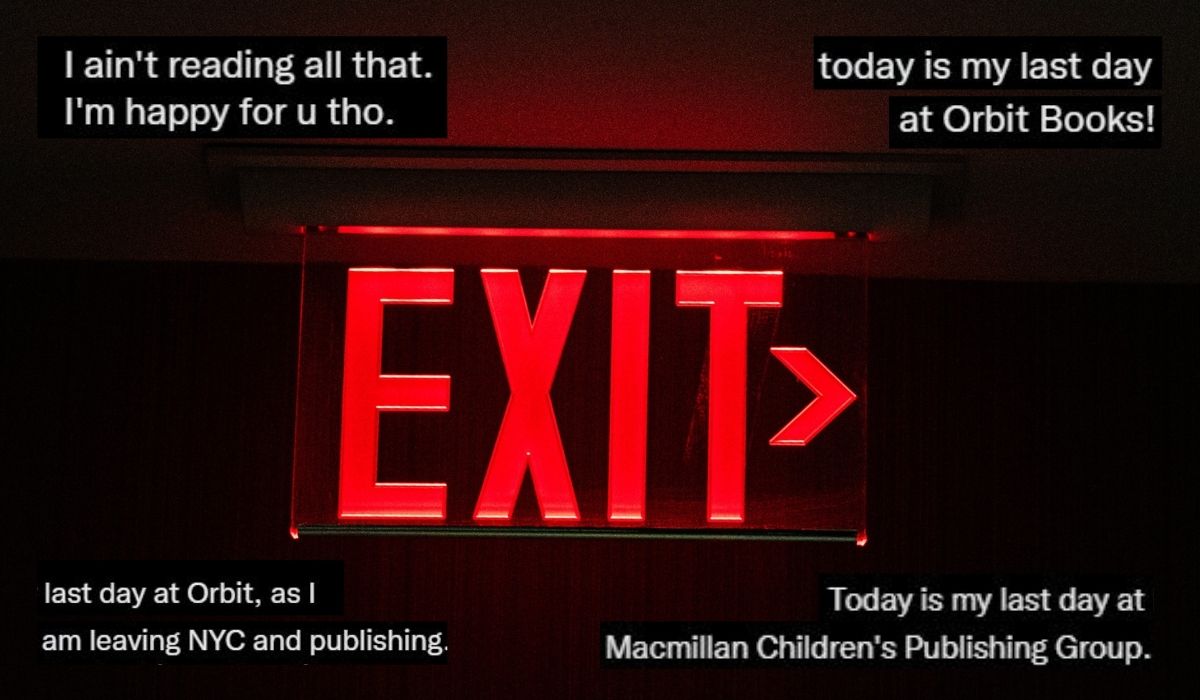We Need To Talk About Last Week’s Publishing Exodus

On March 11, 2022, a surge of news came flooding from the corporate publishing world onto Twitter. People working mid- to lower-level positions within publishing announced their resignation en masse. Many didn’t announce that they were moving to a different major publishing house, either. Instead, they shared that they are pursuing a combination of freelance editing, shifting to indie presses (very few), or quitting the industry altogether.
Literary agent Dana Murphy estimated that somewhere between .5–1% of publishing left that day. This number only accounts for those leaving on that one day and posting about the decision publicly online.
Because I follow many in publishing on the SFF and Speculative Fiction side, much of the fallout I saw came from Orbit (under Hachette) and Tor (under Macmillan). However, the scale of this means it’s likely this came from across the “Big Five” publishers (Hachette, Harper Collins, Simon & Schuster, Macmillan, and Penguin Random House) and their dozens of imprints (genre and/or target age-based).
In addition to those working for the publishers publicly discussing leaving, many authors and those working adjacent to the industry (like me) feel at a loss for words. We’re both happy they are finding peace and sad that it came to this.
Molly Mcghee and Olivie Blake’s The Atlas Six
One of the most discussed resignations comes from former Tor editor Molly Mcghee, only because she wrote an entire letter explaining why she needed to leave. Mcghee noted that despite eight years as junior editor and her first acquired book (Olivie Blake’s The Atlas Six) placed at number three on The New York Times bestseller list, higher-ups told Mcghee that she needed more experience (at least five years) before any promotion. Many in publishing backed up her claim that having an acquired book make the NYT bestseller list was a “career-high.”
Adding insult to injury, this acquisition was a big deal in the industry. It marked a significant move on capitalizing the influence of BookTok. Atlas Six went viral on TikTok as a successful self-published novel before Mcghee acquired Blake’s novel for Tor (a.k.a. Tom Doherty Associates and Macmillan). There is now a fierce bidding war for the film/TV rights for this first novel in the trilogy.
In addition to detailing her promotion rejection, Mcghee called out upper leadership for overworking her and other junior employees withing publishing at large. She argues that many in the executive positions are “technologically illiterate” and so they push the work onto the junior employees “who are expected to perform both full time admin work in addition to their full time jobs.”
Why are so many leaving?
Mcghee’s specific circumstances reflect larger issues of exploitation in publishing. Despite record sales (especially the climb since the COVID-19 pandemic began) in EVERY age group and medium (print, ebook, and audio), wages have stagnated. The routine mergers (including the Penguin and Simon & Schuster one now under DOJ investigation) will worsen this situation.
On March 12, author Ken Carter covered this exodus on Medium and noted this issue in publishing is not U.S.-based or even new. No matter how many times we see poorly planned, industry-led initiatives to get marginalized voices in the field, publishing is already broken and fails to meaningfully address these issues. Many are pointing to the area of corporate publishing as yet another industry devalued because of its domination by women (like education, libraries, healthcare, etc.). Women, and especially women of color, were the majority of people last week sharing that they were leaving the industry.
Twelve days before this significant exodus, The Print Run Podcast discussed this topic in terms of editors leaving en masse between the time of recording (February-ish) and September 2021. They discussed the way editors leaving publishing felt the need to explain themselves because, despite the exploitation, the industry and positions are romanticized.
Another issue is that despite all the technology we have today and two years of remote work, the publishing industry insists on being NYC-based. The housing crisis is happening all over the United States, but NYC remains one of the most expensive places to live. So, like many other situations where wages stay low, there’s little to no room for advancement or flexibility in work location—people are leaving. Economists and CEOs can spar over calling it “The Great Resignation” versus “The Great Reshuffling,” but it’s happening regardless of how it’s worded and is now a very public issue in the book world.
(via Twitter, image: Tony Webster via Flickr and screencaps.)
The Mary Sue may have advertising partnerships with some of the publishers and titles on this list.
—The Mary Sue has a strict comment policy that forbids, but is not limited to, personal insults toward anyone, hate speech, and trolling.—
Have a tip we should know? tips@themarysue.com